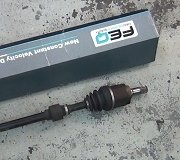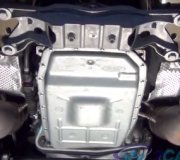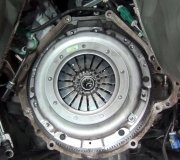Are you referring to a wobble in the wheel that you can see, or is it a shimmy you feel in the steering wheel? Here's a link to an article that can shed some light on common half shaft problems:
https://www.2carpros.com/articles/symptoms-of-a-bad-cv-axle-joint
This article provides a lot more information:
https://www.2carpros.com/articles/steering-wheel-shakes-when-accelerating-or-braking
If you see the tire and wheel wobble as it rotates, the far better suspects are a bent wheel and a broken belt in the tire. Either one can cause the steering wheel to oscillate back and forth when driving slowly, as through a parking lot. The photos below show some examples of a broken belt. The most common is in the lower left with the blue arrow. It has a hump, or "tumor" in one area, usually on the inside edge of the tread. My drawing in the lower right is a much less common form that you won't see, but it will cause an elusive vibration that is hard to identify. It's also much harder to spot. As you rotate the wheel, the tread that contacts the road surface looks perfectly fine, but here the belt has been coming apart so slowly, that over time, the hump has worn down, so it looks normal. You have to look deeper in the grooves to find the evidence of the broken belt. The red arrow is pointing to the raised spot in one section of the tire.
Also please share any history that led up to this. If the wheel was removed recently, suspect debris got caught between the wheel and rotor or the rotor and the hub. Debris from the wheel is real common with cast wheels.
A good place to start is by raising the front tires off the ground,
https://www.2carpros.com/articles/jack-up-and-lift-your-car-safely
(be sure to use jack stands), then place a dial indicator at the lip of the wheel where the weights go. Rotate the wheel and read the amount of "lateral runout". As a general rule, if the wobble is bad enough to feel in the seat, it's bad enough to see by eye without needing the dial indicator. If you suspect a broken tire belt, our natural tendency is to run our hands over the area. Be careful when touching the area as there are usually very sharp wires sticking out. Swear words are common when you find those.
Another way to identify a bent wheel is to switch the front and rear, then see if the sensation is different. A bent wheel on the rear is felt in the seat. A bent wheel in the front is more likely to be seen in the steering wheel. The same is true with broken belts.
If you still suspect a half shaft, tell me at what speeds you feel it, and under what conditions. A worn inner CV joint can cause a wobble in the steering wheel, but only up to a certain speed, and only when under load.
Image (Click to make bigger)
Monday, November 20th, 2023 AT 5:35 PM




